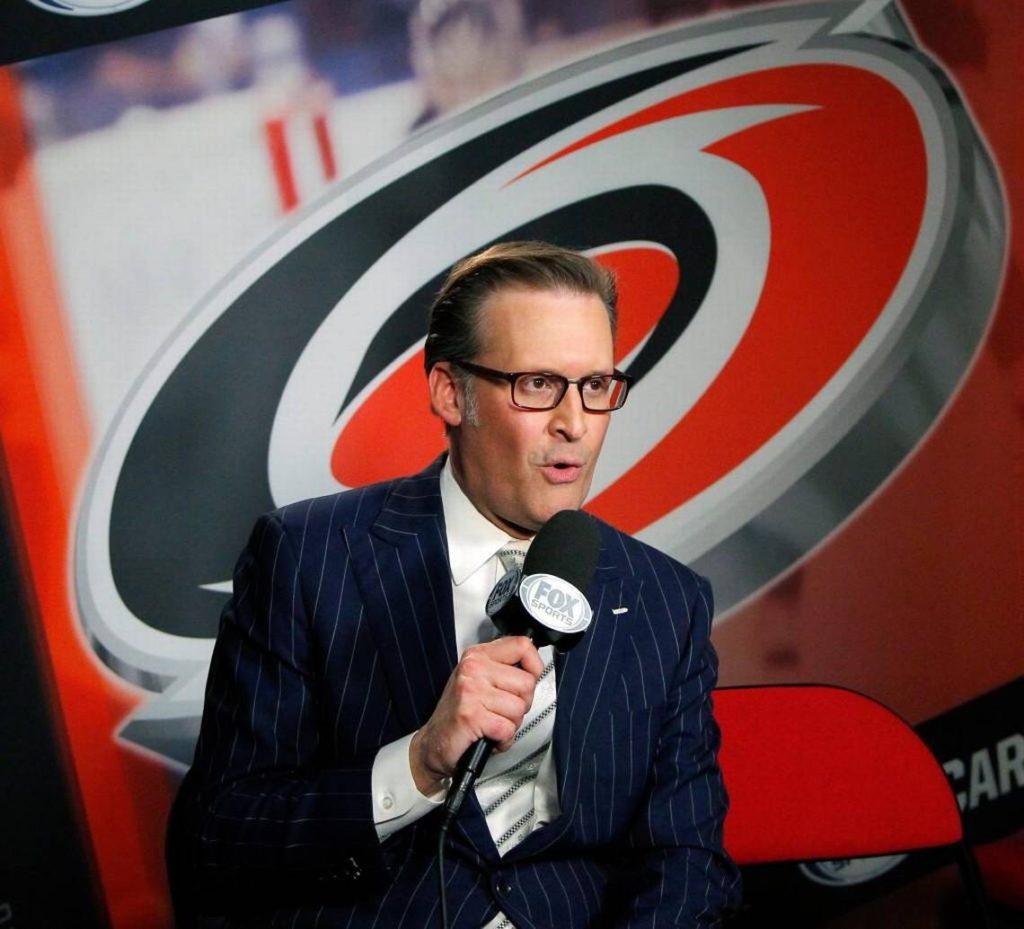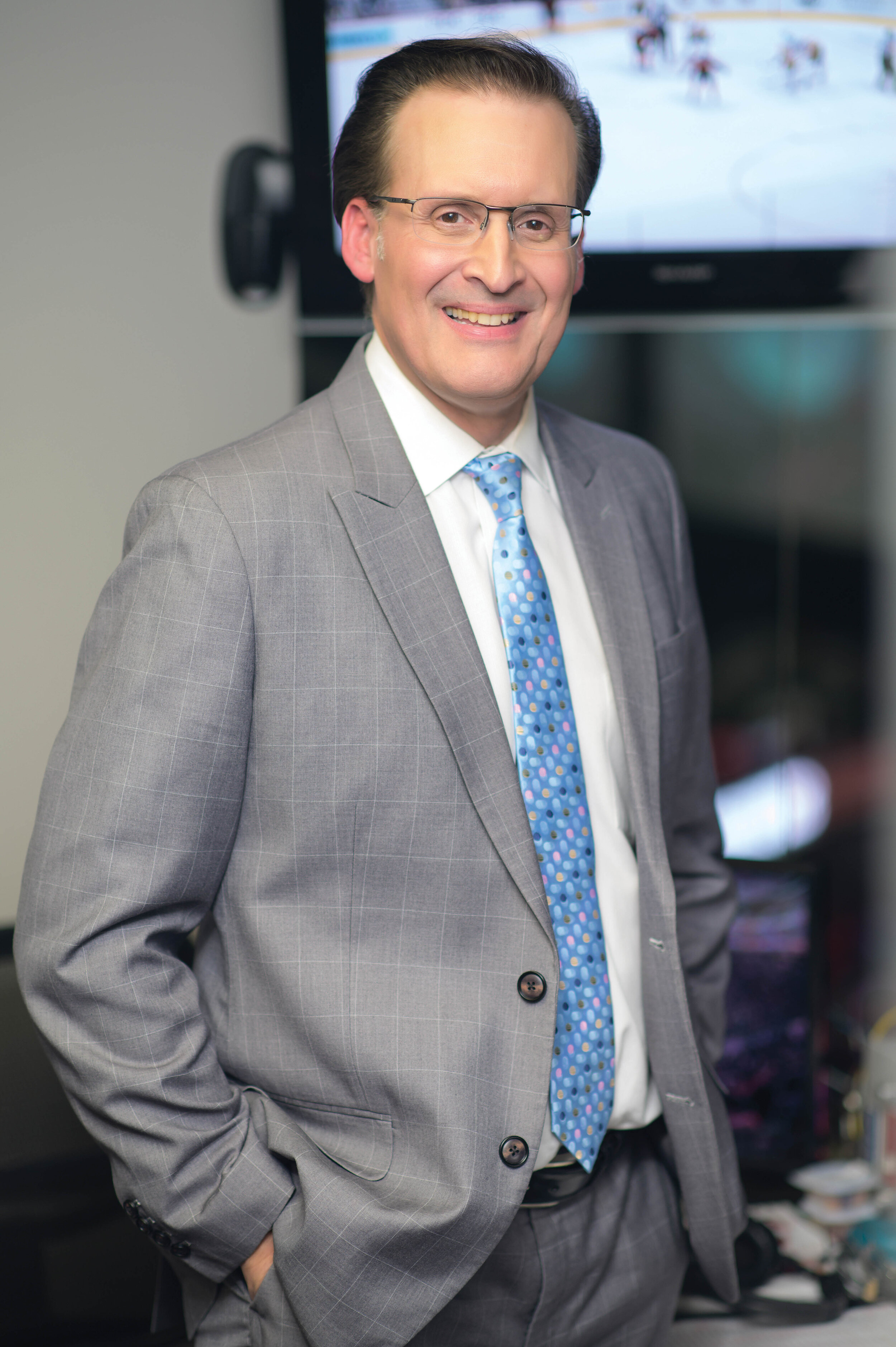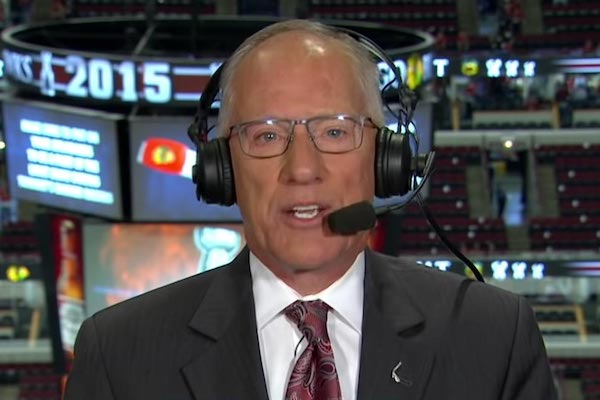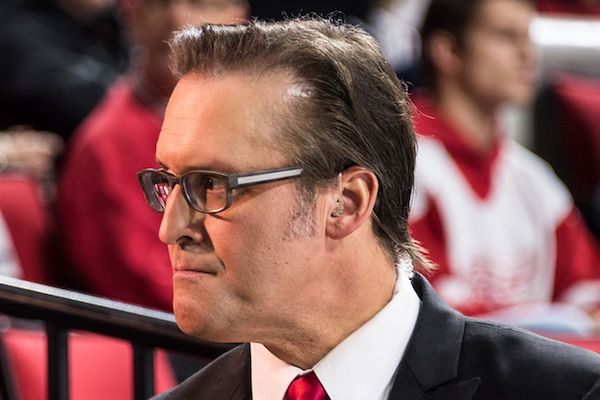2020 was a challenging year for many. No sport was unaffected by cancellations, postponements and weird seasons. No individual in the business seemed to be able to avoid the craziness, no matter your actual job.
There are many that were very happy to see the calendar turn, including many broadcasters. One of them is John Forslund. The veteran NHL play-by-play man found himself quarantined, then in a couple of bubbles and now getting ready to start a hockey season without a team.

Forslund was the long-time announcer for the Hartford Whalers/Carolina Hurricanes. He joined the organization in 1991 and was its television voice from 1995 until his contract expired at the end of the 2020 regular season. Contract negotiations broke off and Forslund will not return. However, he’s still calling games this season, for NBC and NBCSN.
I was able to spend a little time with Forslund via phone as he and his analyst Eddie Olczyk were preparing for their first game of the season. They called the Blackhawks and Lightning game in Tampa Bay on Wednesday.
Andy Masur: So, John, remind everybody just how crazy your 2020 was…
John Forslund: Well, you know it (the craziness) started in March when we (Carolina Hurricanes) were in Detroit. Me having the unfortunate occurrence of having the same room Rudy Gobert of the Utah Jazz occupied when they came through to play the Pistons. The Hurricanes came through there the last weekend before the pause. We departed Detroit and went to New Jersey; we were supposed to play there on March 12 or there about.
I was told that I was exposed to (COVID-19) and I had to come home. I thought I might get a test but at the time there wasn’t testing unless you had symptoms, and luckily, I had no symptoms. I did a 14-day quarantine, then went to the Toronto bubble had a 5-day quarantine in my hotel room there, which was a lot worse than my basement, obviously. Then I did 70 straight days in the two bubbles which was fantastic professionally, historic just to be a part of it.
I think what we’re all learning here is that you change on the fly and you adapt. Now we have a new season, with different circumstances, same virus, but now we’re kind of attacking it differently and we’ll see where it goes.
AM: What is the set up this season on NBC and NBCSN? Will you be at the games in person or off-site in a studio?
JF: It’s going to be a mix, we’re going to be on site for the first two games, then I’m going to Stamford, CT next week to do four games from the studio. It’s going to be a mix and match type thing for at least two months. We’re only scheduled thru the end of February, then a new schedule will come out and we’ll see what march and April have for us. Again, you just kind of adapt and do the best you can with it. Hopefully we’ll get some better days.
AM: I’m sure it wasn’t easy to call the games in the bubbles, in Toronto and Edmonton. Prep had to be crazy without any ability to really talk to anyone involved face to face. I’m sure you felt kind of felt separated…right?

JF: Socially you feel separate. That’s one thing and it’s kind of emotional too because it doesn’t feel the same. You add in professionally, I say that because we never got to see a practice, we never got to see a morning skate. Doesn’t sound like you’re missing much, but I’m not talking about just accessing the players or tidbits or information from coaches and so on, because we were all Zoomed in on all those things, but from my perspective just seeing line combinations and power plays in the mornings for identification purposes.
Basically, what ended up happening is we’d get to the rink for the game and watch the warm up and you would adapt then. We would watch the warm up and do it that way. It’s not the best way to do it but it is the only way to do it and we did.
AM: Considering how long you were with the Whalers/Hurricanes organization, how strange is it to not to be getting ready for a team’s opener this season?
JF: This is going to be way different for me, because I’ve never been in my career, I’ve never been not with a team, starting with the American league in Springfield back in ‘84, joining the Whalers in 91, coming to Carolina in 97 and doing all that. I’m in a better spot than I was in June and July when it first happened.
Looking back a lot and looking ahead, that’s good. I still haven’t reconciled as to the why, but the why wasn’t my doing. It’s somebody else. They have to figure out why they did it. It is the way it is; we’ll just make the best of it moving forward and I’ll just keep my options open.
AM: I know you’re grateful for the NBC job, but can you explain why it’s more desirable to work for a team in the NHL, than to do National Games? Or are they not mutually exclusive?
JF: If you can do both, you’re in a great position. I’m very lucky I’ve been able to do both. Look at all the years Doc Emrick did with New Jersey and the national package. Over the last ten years or so he cut back his travel and NBC afforded him the opportunity to be the lead voice and that’s just tremendous.

I think for all of us, if you can tell the story of a team from day one to the end that’s something. You have a direct connection with a fan base, that’s a real privilege. If you get to mark moments of time like I did in Carolina you know every moment of that franchise until now, that’s pretty special.
The other hand is your national work, now the national games again, it’s a privilege to be asked, you’re serving two fan bases in the country and you’re doing a totally different presentation in a way, which is equally challenging and also its rewarding just in a different way.
I’ve been lucky, I’d like to keep it that way moving forward. We’ll see what happens; right now I’m in a real good spot with this package with this year and we’ll see where it goes.
AM: What role will you have this year for NBC and NBCSN with Doc Emrick retiring and Kenny Albert in the mix as well?
JF: I think we’re a team, that’s the way it’s been explained to me. I think we’re all going to be involved. That’s a good thing.
Doc is really hard to replace. I don’t know that anyone can at this point. It’s great. Kenny has earned his spot; I hope that I have too. I’ll just go ahead with my schedule and get through the season and hopefully get lots of playoff work.
AM: How much has the game of hockey evolved from a television standpoint? They used to use the Fox “glow puck” in the early days. I’m sure HD-TV has helped, right?
JF: I’ll tell you Andy where it’s changed the most is that every telecast is consumable. There were days, depending on what market you worked in or what team you worked for you could be in a black hole, or you could get unbelievable exposure if you worked in New York, Chicago or Los Angeles, right? Today with the NHL package and the way the games are consumed, if you’re a hockey fan and you want to watch a game, you can. That’s basically up to the fans.
I’ve always looked at it now as we’ve never had more exposure, never had more of a challenge to do a good job at the local and national level than we do today. We’re lucky in a way that pro sports are maybe overconsumed in terms of television, but I don’t think fans can get enough of this stuff. If they want to lock in on a Vegas/Arizona game they can. If they want to watch the Hawks and Detroit they can. That’s the way I look at it. I just think that’s where it’s changed.
Technology and the presentation of the games have changed too. The way games look with high definition that’s way better, so hockey’s in a good spot. I think it translates well on television, hopefully we’re not going to need that glowing puck, interesting as that was, and maybe a reach at something. I thought it was kind of cool for its time but today you can see it, you can see it as if you’re in the arena, which is a really good thing and I think that was the beauty of the bubble right?
The two bubbles were laid out perfectly for television, the league did an unbelievable job with the setting, how they draped the arenas with video boards and the draping and so on. We’re not going to have the same type of thing here, because we’re going from building to building. It’ll be close, but it’s not going to be like those theaters they had in Toronto and Edmonton. That was really cool the way they did that.

Forslund is a pros pro, not only in the way he calls and preps for a game, but for his mindset. Leaving a place that’s been home for the better part of 3 decades is a jolt to the system for anyone. I could tell from talking with him that its certainly a sore spot and rightfully so. What impresses me about him is the “all systems go” approach for what is in front of him, not what’s behind him.
Andy Masur is a columnist for BSM and works for WGN Radio as an anchor and play-by-play announcer. He also teaches broadcasting at the Illinois Media School. During his career he has called games for the Chicago Cubs, San Diego Padres and Chicago White Sox. He can be found on Twitter @Andy_Masur1 or you can reach him by email at Andy@Andy-Masur.com.







